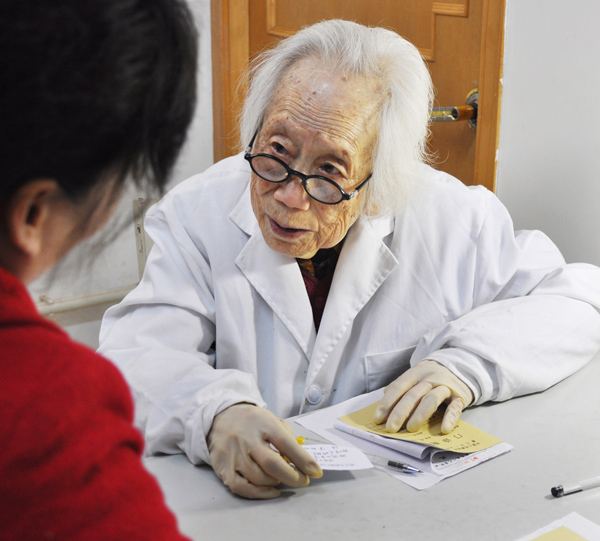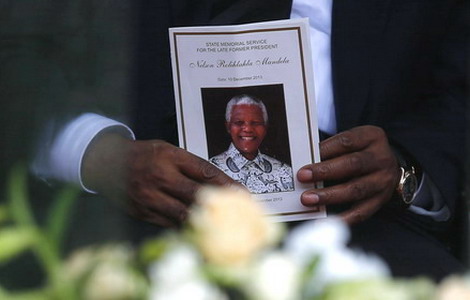Retirees saddled with kids' costs
Updated: 2013-12-10 23:55
By Gao Changxin in Shanghai (China Daily)
|
||||||||
 |
|
A 97-year-old gynecology specialist, Hu Peilan, gives a patient medical advice on April 12, 2013, in Zhengzhou, Central China's Henan province. Hu is regarded as one of China's oldest doctors and earns praise for her medical skills. |
If you're retiring in China, you can pretty much forget about the vacation house in Miami Beach, the trips to Europe and the 18-hole golf courses.
While some of your more fortunate counterparts in the West might enjoy such luxuries, chances are that when you retire here, you will still have to support your kids.
Li Quan, 57, a Shanghai resident, said he never dreamed of owning a beach house. He retired three years ago, and has been helping pay his son's mortgage while holding weekly family dinners with his retired wife.
Working at a US company, the 32-year-old son is by no means a slacker. In fact, the junior Li is among the more successful of his age group, making $1,000-$1,500 a month, depending on perks, and looking at a bright future up the corporate ladder.
It's just that, as a new husband, he is finding himself behind on bills and stretching to provide for his family in a city where home prices are more than 28 times the median annual household income.
"There is no shame in it. It's the reality here," said the elder Li. "It's your son, so you've got to do what you've got to do."
Li is far from alone in China, as HSBC Life Insurance Co found out. In a survey published on Tuesday, the insurer said that more than four in five — 76 percent — of wage-earners in the Chinese mainland expect to significantly fund family members after retirement.
Among those already retired, more than seven in 10 — 71 percent — are burdened with family financial responsibilities, beating the global average of 45 percent.
The survey polled more than 16,000 people in 15 markets, with more than 1,000 respondents from the Chinese mainland.
About 59 percent of people who are still working expect to support their children financially during retirement. Another 10 percent expect to support both their children and their grandchildren. And about 32 percent say they expect to support both their grandchildren and their parents.
Of those already retired, 40 percent are supporting their children, 28 percent their parents and 9 percent their grandchildren, the survey found.
"Today's demanding work environment drives the aspiration for a comfortable and relaxing retirement," said Jim Costello, HSBC Life's appointed CEO designate.
"Funding of dependents in retirement is common within the Chinese mainland, and this factor will continue to be a major consideration in retirement planning," Costello said.
He added that the gap between retirement expectations and reality has resulted in retirees' sacrificing their personal desires.
Chinese parents are more willing to make that sacrifice than their Western counterparts, said Yu Hai, a professor of the sociology department at Fudan University in Shanghai.
The well-being of children is culturally embedded in the minds of Chinese parents, he said.
"In fact, today in China, the common thing is for parents to chip in for a child's home. Not chipping in is uncommon."
That's if the parents have the financial means to contribute. If they don't, they are more willing to open their doors to the younger generation, and the children move in for the economic advantage.
Today's difficult economic reality, combined with parents' willingness to provide, has created a growing group of "mama's boys" who turn to their parents for support, Yu said.
A 2011 survey by Shanghai's family planning authorities found that about 30 percent of young married couples live with their elders.
Wage increases in China since the country's opening-up in the 1980s hardly meet the growth of home prices. And a leaky social security net requires people to save extra money beyond what is needed for a house.
All this combines to make an arduous life for young people who are trying to start families of their own.
In Hong Kong, where home prices and population density are among the world's highest, more than 90 percent of new graduates live with their parents, according to local media reports. All in all, in many cases, not much money is left for fun after retirement.
In response, more retirees these days are seeking continued income through another job, rather than relaxation. And the government may help.

 Obama shakes hands with Cuban president Castro
Obama shakes hands with Cuban president Castro
 S Africa holds memorial service for Mandela
S Africa holds memorial service for Mandela
 World Cup mascot makes China debut
World Cup mascot makes China debut
 Catering to Chinese viewers a hurdle for Hollywood
Catering to Chinese viewers a hurdle for Hollywood
 World's top leaders pay tribute to Mandela
World's top leaders pay tribute to Mandela
 Art students take protest to the mall
Art students take protest to the mall
 German DHL testing delivery drones
German DHL testing delivery drones
 Fire breaks out at construction site in SW China
Fire breaks out at construction site in SW China
Most Viewed
Editor's Picks

|

|

|

|

|

|
Today's Top News
S Africa holds memorial service for Mandela
US Senate extends gun ban
Call for US unemployment benefits extension
Google bus blocked in San Francisco protest
John Kerry to visit Mideast, Vietnam, Philippines
Obama, Bush embark for Mandela memorial
Girl's death spark calls for child services oversight
US urged to change surveillance laws
US Weekly

|

|






